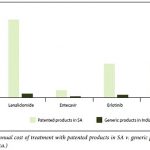Ip
In supporting and taking part in the organisation of the regional multistakeholder policy dialogue around the African Continental Free Trade Area (AfCFTA), ICTSD targeted at filling important understanding gaps round the agreement’s implementation and phase 2 negotiations commencing in August 2018. Particularly, this covered areas for example e-commerce, investment facilitation, competition, and ip in addition to gender equality.
In supporting and taking part in the organisation of the regional multistakeholder policy dialogue around the African Continental Free Trade Area (AfCFTA), ICTSD targeted at filling important understanding gaps round the agreement’s implementation and phase 2 negotiations commencing in August 2018. Particularly, this covered areas for example e-commerce, investment facilitation, competition, and ip in addition to gender equality.
The dialogue produced a wide open and inclusive space for debate around the substance and type of the AfCFTA. Discussions assessed the weaknesses and strengths from the AfCFTA process and set forward recommendations meant to facilitate its optimal implementation within the Economic Community of West African States (ECOWAS) region and identify effective pathways forward for the following phase of negotiations.
Primary takeaways
- Rules of origin: it will likely be vital that you clearly and precisely define the factors that will the identification of merchandise via inside the regional space. The meeting suggested that negotiators adopt flexible rules of origin having a look at making certain priority access for African companies towards the continental market and thus that countries can be cultivated their productive capacities and make regional and continental value chains.
- Sensitive and excluded products: consensus should be arrived at on sensitive products as well as an explicit resolution of these products excluded in the free trade area.
- Different amounts of development: while embracing an ambitious agenda of regional integration, the different socioeconomic realities, industrialisation needs, and structural deficits across countries and regions have to be considered.
- Participation: the possible lack of broad and inclusive consultations with all of relevant stakeholders at national and regional levels is a major deficiency which has driven legitimate concerns expressed by actors in lots of countries concerning the trade deal’s outcomes.
- Timelines: sometimes, faster negotiations and tight deadlines haven’t permitted for correct analyses and evaluations to become transported out to be able to formulate informed and shared positions – including with regards to political economy factors.
- Regional Economic Communities (RECs): the AfCFTA should be designed being an instrument to bolster the achievements the RECs. It had been suggested that ECOWAS countries should preserve the integrity from the customs union, particularly by stopping people from making commitments or applying the AfCFTA individually and/or outdoors of the regional obligations.
- Coherence with exterior commitments: Participants agreed it had become vital that you seize the chance from the AfCFTA negotiations to examine numerous existing contracts between African countries and regions using their exterior partners, particularly the economical Partnership Contracts (Environmental protection agency) using the Eu, and also to revise certain protocols and contracts intra-regional where necessary

The dialogue was initiated by several regional and worldwide organisations, and actors, such as the African Center for Trade, Integration and Development (Enda CACID), the Un Institute for Economic Development and Planning (IDEP), the 3rd World Network Africa (TWN Africa), the Worldwide Center for Trade and Sustainable Development (ICTSD), and also the Worldwide Organization of los angeles Francophonie (OIF). The Commissions from the African Union, ECOWAS, and ECCAS, the OSIWA Foundation, and GIZ provided technical and financial support.
A complete meeting report made by Enda Cacid will come in British as well as in French.

Attendance was by invitation only.
Resourse: http://ictsd.org/tags/







